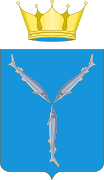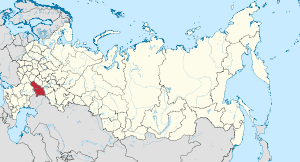Saratov Oblast
| Saratov Oblast Саратовская область (Russian) | |||
|---|---|---|---|
| — Oblast — | |||
| |||
|
| |||
| |||
|
| |||
| Political status | |||
| Country | Russia | ||
| Federal district | Volga[2] | ||
| Economic region | Volga[3] | ||
| Established | December 5, 1936[4] | ||
| Administrative center | Saratov | ||
| Government (as of July 2014) | |||
| • Governor[5] | Valery Radayev[6] | ||
| • Legislature | Oblast Duma[5] | ||
| Statistics | |||
| Area (as of the 2002 Census)[7] | |||
| • Total | 100,200 km2 (38,700 sq mi) | ||
| Area rank | 36th | ||
| Population (2010 Census)[8] | |||
| • Total | 2,521,892 | ||
| • Rank | 19th | ||
| • Density[9] | 25.17/km2 (65.2/sq mi) | ||
| • Urban | 74.5% | ||
| • Rural | 25.5% | ||
| Population (beginning of 2014 est.) | |||
| • Total | 2,496,600[10] | ||
| Time zone(s) | SAMT (UTC+04:00)[11] | ||
| ISO 3166-2 | RU-SAR | ||
| License plates | 64, 164 | ||
| Official languages | Russian[12] | ||
| Official website | |||
Saratov Oblast (Russian: Сара́товская о́бласть, Saratovskaya oblast) is a federal subject of Russia (an oblast), located in the Volga Federal District. Its administrative center is the city of Saratov. As of the 2010 Census, its population was 2,521,892.[8]
Geography
The oblast is located in the southeast of European Russia, in the northern part of the Lower Volga region. From west to east its territory stretches for 575 kilometers (357 mi), and from north to south for 330 kilometers (210 mi).
The oblast borders on:
- Volgograd Oblast to the south
- Voronezh and Tambov oblasts to the west
- Penza, Samara, Ulyanovsk and Orenburg oblasts to the north;
- the Republic of Kazakhstan to the east
Natural resources
Of particular agricultural importance are valuable agricultural ordinary and southern chernozyom areas; chestnut soils are widespread. The oblast has many water resources: besides the river Volga (which divides the oblast in two) there are many identified sources and mineral-water deposits.
Politics
During the Soviet period, the high authority in the oblast was shared between three persons: The first secretary of the Saratov CPSU Committee (who in reality had the most authority), the chairman of the oblast Soviet (legislative power), and the Chairman of the oblast Executive Committee (executive power). In 1991, the CPSU lost all its power, and the head of the Oblast administration, and eventually the governor was appointed or elected alongside elected the regional parliament.
The Charter of Saratov Oblast is the fundamental law of the oblast. The Legislative Assembly of Saratov Oblast is the province's standing legislative (representative) body. The Legislative Assembly exercises its authority by passing laws, resolutions, and other legal acts and by supervising the implementation and observance of the laws and other legal acts it passes. The highest executive body is the Oblast Government, which includes territorial executive bodies such as district administrations, committees, and commissions that facilitate development and run the day-to-day matters of the province. The Oblast administration supports the activities of the Governor who is the highest official and acts as guarantor of the observance of the oblast Charter in accordance with the Constitution of Russia.
Administrative divisions
Demographics
Population: 2,521,892 (2010 Census);[8] 2,668,310 (2002 Census);[13] 2,686,483 (1989 Census).[14]
Ethnic groups: most of the ethnic Germans who used to live in the area have been repatriated. The German Consulate in Saratov closed in June 2004, stating that there were only 18,000 ethnic Germans left in the oblast (including 2,000 in the city of Saratov)
There were twenty recognized ethnic groups of more than two thousand persons each in Saratov Oblast at the time of the 2010 Census. The ethnic composition was reported to be:[8]
- Russians:(87.6%);
- Kazakhs:(3.1%);
- Tatars:(2.2%);
- Ukrainians:(1.7%);
- Armenians:(1%);
- Azerbaijani:(0.6%);
- Chuvash:(0.5%);
- Mordovians:(0.4%);
- Germans:(0.3%);
- Belarusians:(0.3%);
- Chechens:(0.2%);
- 2.1% others.
- 64,878 people were registered from administrative databases, and could not declare an ethnicity. It is estimated that the proportion of ethnicities in this group is the same as that of the declared group.[15]
- Births (2008): 27,492 (10.7 per 1000)
- Deaths (2008): 39,291 (15.2 per 1000)[16]
- Vital statistics for 2012
- Births: 28 364 (11.3 per 1000)
- Deaths: 35 664 (14.2 per 1000) [17]
Total fertility rate:[18] 2009 - 1.41 | 2010 - 1.40 | 2011 - 1.40 | 2012 - 1.51 | 2013 - 1.54 | 2014 - 1.57 | 2015 - 1.59(e)
Religion
According to a 2012 official survey[19] 30% of the population of Saratov Oblast adheres to the Russian Orthodox Church, 4% are unaffiliated generic Christians, 1% are Orthodox Christians who believe but aren't members of any church or are members of non-Russian Orthodox churches. 2% are Muslims, 1% of the population adheres to Rodnovery (Slavic folk religion), and 0.5% adheres to forms of Hinduism (Vedism, Krishnaism or Tantrism). In addition, 38% of the population declares to be "spiritual but not religious", 16% is atheist, and 7.5% follows other religions or did not give an answer to the question.[19]
See also
References
| Wikimedia Commons has media related to Saratov Oblast. |
Notes
- ↑ The official symbols of Saratov Oblast, enumerated in Article 4 of the Charter of Saratov Oblast, include only its flag and coat of arms.
- ↑ Президент Российской Федерации. Указ №849 от 13 мая 2000 г. «О полномочном представителе Президента Российской Федерации в федеральном округе». Вступил в силу 13 мая 2000 г. Опубликован: "Собрание законодательства РФ", №20, ст. 2112, 15 мая 2000 г. (President of the Russian Federation. Decree #849 of May 13, 2000 On the Plenipotentiary Representative of the President of the Russian Federation in a Federal District. Effective as of May 13, 2000.).
- ↑ Госстандарт Российской Федерации. №ОК 024-95 27 декабря 1995 г. «Общероссийский классификатор экономических регионов. 2. Экономические районы», в ред. Изменения №5/2001 ОКЭР. (Gosstandart of the Russian Federation. #OK 024-95 December 27, 1995 Russian Classification of Economic Regions. 2. Economic Regions, as amended by the Amendment #5/2001 OKER. ).
- ↑ Charter of Saratov Oblast, Preamble
- 1 2 Charter of Saratov Oblast, Article 6
- ↑ Official website of Saratov Oblast. Valery Vasilyevich Radayev, Governor of Saratov Oblast (Russian)
- ↑ Федеральная служба государственной статистики (Federal State Statistics Service) (2004-05-21). "Территория, число районов, населённых пунктов и сельских администраций по субъектам Российской Федерации (Territory, Number of Districts, Inhabited Localities, and Rural Administration by Federal Subjects of the Russian Federation)". Всероссийская перепись населения 2002 года (All-Russia Population Census of 2002) (in Russian). Federal State Statistics Service. Retrieved 2011-11-01.
- 1 2 3 4 Russian Federal State Statistics Service (2011). "Всероссийская перепись населения 2010 года. Том 1" [2010 All-Russian Population Census, vol. 1]. Всероссийская перепись населения 2010 года (2010 All-Russia Population Census) (in Russian). Federal State Statistics Service. Retrieved June 29, 2012.
- ↑ The density value was calculated by dividing the population reported by the 2010 Census by the area shown in the "Area" field. Please note that this value may not be accurate as the area specified in the infobox is not necessarily reported for the same year as the population.
- ↑ Saratov Oblast Territorial Branch of the Federal State Statistics Service. Численность населения на начало 2014 г. (Russian)
- ↑ Правительство Российской Федерации. Федеральный закон №107-ФЗ от 3 июня 2011 г. «Об исчислении времени», в ред. Федерального закона №271-ФЗ от 03 июля 2016 г. «О внесении изменений в Федеральный закон "Об исчислении времени"». Вступил в силу по истечении шестидесяти дней после дня официального опубликования (6 августа 2011 г.). Опубликован: "Российская газета", №120, 6 июня 2011 г. (Government of the Russian Federation. Federal Law #107-FZ of June 31, 2011 On Calculating Time, as amended by the Federal Law #271-FZ of July 03, 2016 On Amending Federal Law "On Calculating Time". Effective as of after sixty days following the day of the official publication.).
- ↑ Official on the whole territory of Russia according to Article 68.1 of the Constitution of Russia.
- ↑ Russian Federal State Statistics Service (May 21, 2004). "Численность населения России, субъектов Российской Федерации в составе федеральных округов, районов, городских поселений, сельских населённых пунктов – районных центров и сельских населённых пунктов с населением 3 тысячи и более человек" [Population of Russia, Its Federal Districts, Federal Subjects, Districts, Urban Localities, Rural Localities—Administrative Centers, and Rural Localities with Population of Over 3,000] (XLS). Всероссийская перепись населения 2002 года [All-Russia Population Census of 2002] (in Russian). Retrieved August 9, 2014.
- ↑ Demoscope Weekly (1989). "Всесоюзная перепись населения 1989 г. Численность наличного населения союзных и автономных республик, автономных областей и округов, краёв, областей, районов, городских поселений и сёл-райцентров" [All Union Population Census of 1989: Present Population of Union and Autonomous Republics, Autonomous Oblasts and Okrugs, Krais, Oblasts, Districts, Urban Settlements, and Villages Serving as District Administrative Centers]. Всесоюзная перепись населения 1989 года [All-Union Population Census of 1989] (in Russian). Институт демографии Национального исследовательского университета: Высшая школа экономики [Institute of Demography at the National Research University: Higher School of Economics]. Retrieved August 9, 2014.
- ↑ http://www.perepis-2010.ru/news/detail.php?ID=6936
- ↑ http://srtvstat.renet.ru/digital/region1/default.aspx
- ↑ http://www.gks.ru/free_doc/2012/demo/edn12-12.htm
- ↑ http://www.gks.ru/wps/wcm/connect/rosstat_main/rosstat/ru/statistics/publications/catalog/doc_1137674209312
- 1 2 3 Arena - Atlas of Religions and Nationalities in Russia. Sreda.org
- ↑ 2012 Survey Maps. "Ogonek", № 34 (5243), 27/08/2012. Retrieved 24-09-2012.
Sources
- Саратовская областная Дума. Закон №46-ЗСО от 2 июня 2005 г. «Устав (Основной Закон) Саратовской области», в ред. Закона №54-ЗСО от 28 апреля 2015 г. «О внесении изменений в Устав (Основной Закон) Саратовской области». Вступил в силу после официального опубликования. Опубликован: "Неделя области", Спецвыпуск, №38 (156), 4 июня 2005 г. (Saratov Oblast Duma. Law #46-ZSO of June 2, 2005 Charter (Basic Law) of Saratov Oblast, as amended by the Law #54-ZSO of April 28, 2015 On Amending the Charter (Basic Law) of Saratov Oblast. Effective as of after the official publication.).
 |
|
 | ||
| |
|
West Kazakhstan Province, | ||
| ||||
| | ||||
| |



